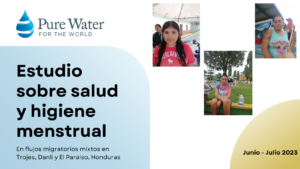Blog written by Emery Letendre, PWW Intern. Shared with permission.
 This summer I traveled to Honduras for eight weeks with Pure Water for the World. I created a survey to study the menstrual hygiene and health needs of women migrating through Honduras. The survey had five main objectives:
This summer I traveled to Honduras for eight weeks with Pure Water for the World. I created a survey to study the menstrual hygiene and health needs of women migrating through Honduras. The survey had five main objectives:
- Determine which types of menstrual products are the most desirable and convenient for women to use during their migration journey.
- Determine what is the best way to distribute resources to maximize access for migrant women to feminine products.
- Determine how menstrual products are disposed of after use during the migration journey.
- Determine the accessibility of menstrual hygiene products during the migration journey through Honduras and the level satisfaction with current services provided.
- Determine the prevalence of menstrual health difficulties for migrant women, including how and where they receive care and how easy it is to access care.
>> Click here to view survey (in Spanish)
Over the months of June and July 2023, nine (9) PWW staff members and myself conducted the survey in migrant shelters in the towns of Trojes, Danlí and El Paraíso, all located in the southern region of Honduras near the border with Nicaragua. We finished conducting surveys on August 4th, completing 673 surveys in total.
We found that women were eager to participate in our survey and share their thoughts and opinions, even knowing the survey was on the longer side, with 44 questions and a length of 15-20 minutes. In the survey we primarily asked multiple choice questions, but gave many opportunities for women to share more detailed answers if they wished.
>> Click here for a presentation of the survey results (in Spanish)
Some of our key findings include:
- Migrant women traveling through Honduras during this period were an average of 29 years old, with 82.2 percent from Venezuela, 4.6 percent from Ecuador, 4.2 percent from Columbia and 3.4 percent from Cuba.
- 93.5 percent of women understand the concept of menstruation and 89.5 percent understand the concept of the menstrual cycle. Women gained this knowledge most commonly at home (42.5%) or in school (22.7%).
- Sanitary pads were the most popular menstruation product, with 83.7 percent of women using sanitary pads during their migration journeys and 82.3 percent indicating preference for sanitary pads among 11 options.
- Of the women we interviewed, 75 percent had menstrual products with them currently. 62.4 percent of women had acquired these products at migration shelters.
- Women were very satisfied with the services offered at the migrant shelters in Honduras but had three main requests for products that would improve their menstrual health and hygiene during their migration journeys. 173 women requested wet wipes, 159 requested intimate soap and 117 requested underwear.
The survey findings and analysis will be used to better meet the needs of migrant women in shelters throughout Honduras. Findings will be shared with the other organizations that are a part of the LIFE-Honduras Consortium so they can adjust their services and current product offerings for migrant women accordingly.
